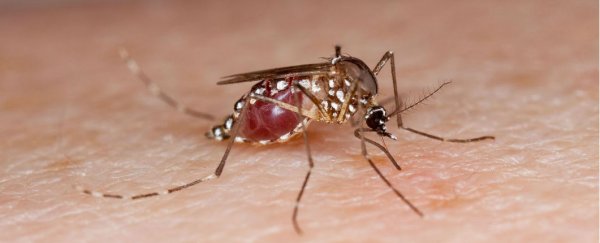Scientists have identified a gene within the Aedes aegypti mosquito that can be used to switch their sex, transforming disease-carrying females into benign males.
The finding could result in new population control strategies, increasing the ratio of males, and helping to curb deadly diseases such as chikungunya, dengue and yellow fever, all of which are transmitted by the A. aegypti mosquito.
When it comes to mosquito-borne diseases, females are the villains. While males feed on flower nectar, females feast on humans, sucking our blood in order to gather essential nutrients, which they need to produce eggs.
If there were a way to limit the number of females, conventional thinking follows that disease transmission rates would decline.
Now, researchers from Virginia Tech in the US have identified and isolated the sex determining gene - which they call Nix - and have used it to change the sex-organs of female mosquitoes.
"Nix provides us with exciting opportunities to harness mosquito sex in the fight against infectious diseases because maleness is the ultimate disease-refractory trait," one of the team, biochemist Zhijian Jake Tu, said in a press release.
Geneticists have struggled to find this gene because it's located in what the team calls a "genomic black hole", which is essentially an unmapped area of the genome.
But the Virginia Tech team managed to identify the gene - found naturally in males - through extensive computer analysis. Next, they used a gene-editing method known as CRISPR-Cas9 to turn the gene off, which caused the males to develop female sex organs.
They then injected the Nix gene into mosquito embryos, and according to the study published in Science, found that more than two-thirds of the would-be female mosquitoes developed male genitals.
"We're not there yet, but the ultimate goal is to be able to establish transgenic lines that express Nix in genetic females to convert them to harmless males," another team member, Zach Adelman, said in the release.
It's an exciting result, as it could provide a stepping-stone for controlling mosquito populations. But making use of this technology in the wild could prove tricky.
The Nix gene is passed down between males, so the researchers need to develop a way of making it occur naturally in female embryos.
The plan is to integrate Nix into the part of the mosquito genome that is inherited by both males and females, Jake Tu told Gwynn Guilford at Quartz.
If they could create a transgenic line of males that carry a female-affecting Nix gene, he said, they could release them into the wild, and this could have a major impact on the sex balance of mosquito populations. So long as those genetically modified males reproduced like crazy, of course.
The team faces all kinds of challenges to get there, but it might just be a viable strategy to help combat a whole range of deadly diseases. And as George Dvorsky reports for i09.com, the US Food and Drug Administration (FDA) is already considering a similar plan to prevent tropical diseases in Florida.
